The History of Martin Luther King Jr. Day at JMU
AAAD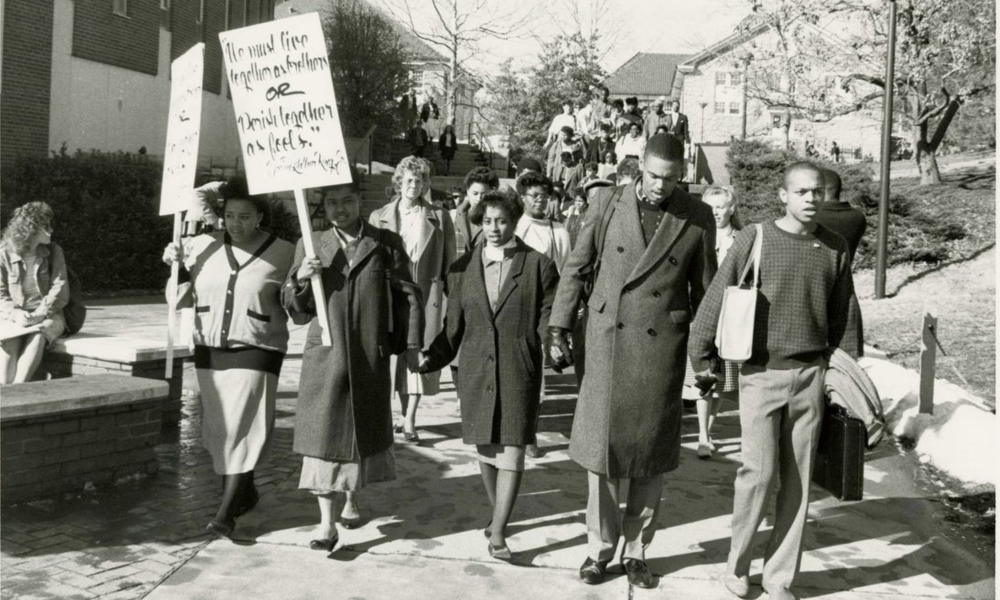
SUMMARY: Martin Luther King Jr. Day was adopted as a national holiday in 1983, but it wasn't recognized as a university holiday at JMU until 2001, even though groups on campus such as the Center for Multicultural Student Services (CMSS) and Greek organizations like Alpha Phi Alpha and Alpha Kappa Alpha held celebrations in honor of MLK as early as 1977. So, what brought about this big change in 2001? In short, student activism. Read on to learn about how a student protest changed the university calendar at JMU.
Bills proposing JMU recognize and observe MLK Day as a university holiday were put forth by JMU’s Student Government Association (SGA) in both 1997 and 1998 but even though both bills passed through the senate, the university did not take action until 2000 when afternoon classes were first canceled so that students could participate in Black Student Alliance (BSA) and CMSS events honoring MLK.
The university's initial refusal to make MLK Day a holiday sparked a debate on campus that populated editions of The Breeze for the entirety of 1999, thanks to JMU’s committed SGA members refusing to let the issue drop. On April 15, 1999, The Breeze published the news that the initiative was voted no by a “clear majority” (1) but “a task force” was formed to debate whether or not to “let students out of classes beginning at 12:20pm on MLK Day” (1). The SGA members, namely Tim Emry (’99), were frustrated by this approach. An editorial published a week later remarked on the issue:
"It’s a shame and an outrage that the council rejected SGA President Tim Emry’s carefully constructed proposal to cancel classes on MLK Day. […] [R]ather than passing the proposal and mandating how JMU would mark the occasion, the council voted unanimously to establish a task force to explore the possibility of canceling evening classes on a Monday, Tuesday, or Wednesday next year to use that time to honor King. […] Devoting a portion of a day of regular classes to honor King is an improvement over the current situation of holding all classes on MLK Day. However, this is just not enough” (12)
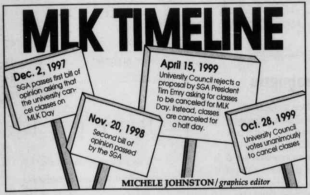
Over the course of 1999, The Breeze received several Letters to the Editor and Op-Eds expressing heated opinions on both sides of this issue. Then, in September of 1999–just five months after creating the task force–JMU announced they would be canceling classes for the inauguration of JMU president, Linwood Rose, attendance of which was being made mandatory for freshmen. Making this event a holiday struck a chord with students and faculty who had been working for the last two years to change the university calendar to give students a day off of classes for the celebration of MLK Day.
On September 13, 1999, The Breeze reported on the growing debate between those who saw the decision to cancel classes for the inauguration as hypocritical in the face of the efforts of SGA to have them canceled for MLK Day and those who saw these two issues as incomparable. Faculty and students quoted in the article were split on the issue.
Former political science professor, Robert Roberts found the comparison inadequate: “Inauguration day is once, MLK Day would be a permanent holiday, and that’s a major distinction. To add additional holidays, that may be warranted, puts an additional strain on the academic calendar. I don’t support that” (9)
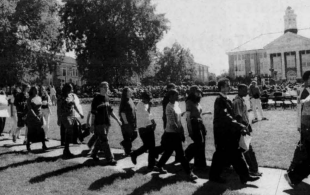
Former JMU professor and current member of the AAAD Studies Center’s External Advisory Board, Nikitah Imani, on the other hand, was “very seriously” concerned by the “two-page letter explaining why we need off for [the inauguration], basically saying that it is an important event in the life and course of the university. That rationale, if it is valid, is also valid for MLK Day, an important holiday for the whole country” (9).
Imani called out the hypocrisy in the university's decision, citing the chief reasoning behind the earlier decision to not cancel classes for MLK Day: that "students would not use the day as a learning experience, but rather as a free day,” an argument not presented in reference to the inauguration (9).
"Inauguration day has a whole series of events reinforcing the ideas and importance of inauguration. It seems to me we can do the same for MLK Day. If it’s true that students wouldn’t attend these events, then we have a problem that needs to be solved, not an excuse [for ignoring the holiday]." -Nikitah Imani, The Breeze, 1999
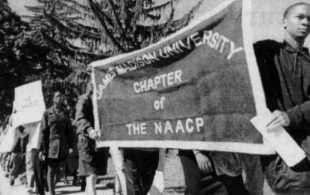
Zebulun Davenport, former director of CMSS, agreed: “Whether or not students are on this campus, I can still celebrate MLK. If they have the day off, they can celebrate in their own way. There are many ways people celebrate.” In regards to the inauguration, Davenport said that he saw it as an important event but that he thinks it is “equally important to recognize the accomplishments and teachings of [King]” (9). Student Gerald Irish (’01) added that if student attendance was a valid reason to not acknowledge MLK Day, “there need to be events taking place to commemorate him” (9).
Tim Emry ('99), former SGA president and champion of the movement to recognize MLK Day as a university holiday, told The Breeze he was frustrated and disappointed at the decision to cancel classes for the inauguration but not for MLK Day:
"There is a process to get a day off, and for this they didn’t even go through the process. Saying that students can have a day off, regardless of the process, not to mention we spent two years trying to get MLK Day off, is disappointing. I lose a lot of confidence in the administration. The exact sort of arguments they made against MLK Day seem to [apply] here. It’s indirectly saying that Dr. Rose’s inauguration is far more important than Martin Luther King and what he stood for." -Tim Emry, The Breeze, 1999
In an article printed in that same edition of The Breeze, then junior, Steven Glass, called the “decision to cancel classes […] a slap in the face to those who want MLK Day off” (17).
"I think a lot of people are pretty stung by the whole situation. I know I am. If you ask people our age to name three influential people of this century, I would bet that most of them would name Martin Luther King as one of them. Nevertheless, JMU is saying that his memory isn’t worthy of a day off?" -Steven Glass, The Breeze, 1999
Emry and several other students, including then BSA president Chris Jones, decided to take action. They organized a silent protest of the university’s lack of action in DEI efforts including the recognition of MLK Day, which was held during Rose’s inauguration on September 17, 1999.
Students involved in the protest were very clear that they weren’t protesting the inauguration itself–in fact, the organizers were adamant that the protest be silent so as not to interrupt the ceremony. Rather, they were protesting the hypocrisy at play in the decision to not honor MLK Day as a university holiday but to create a holiday for Rose’s inauguration, as well as what The Breeze called a “laundry list of issues” concerning racial relations and DEI efforts on campus. According to The Breeze, “Their concerns include[d] the lack of diversity at JMU, the university’s poor retention rate of minority students, the small number of minority faculty members and administrators, inadequate funding and an overall feeling that their concerns are largely being ignored by university administrators” (9).
After the protest, Emry told The Breeze that he found the university’s actions “very hypocritical” (3). “For two years, I was told by administrators, ‘You can’t just up and take a holiday off,’ […] [b]ut that’s exactly what happened here. There’s a process to do it with the University Council and they didn’t follow it,” Emry stated. “All of a sudden it was announced there would be no class on Sept[ember] 17 because of this inauguration” (3).
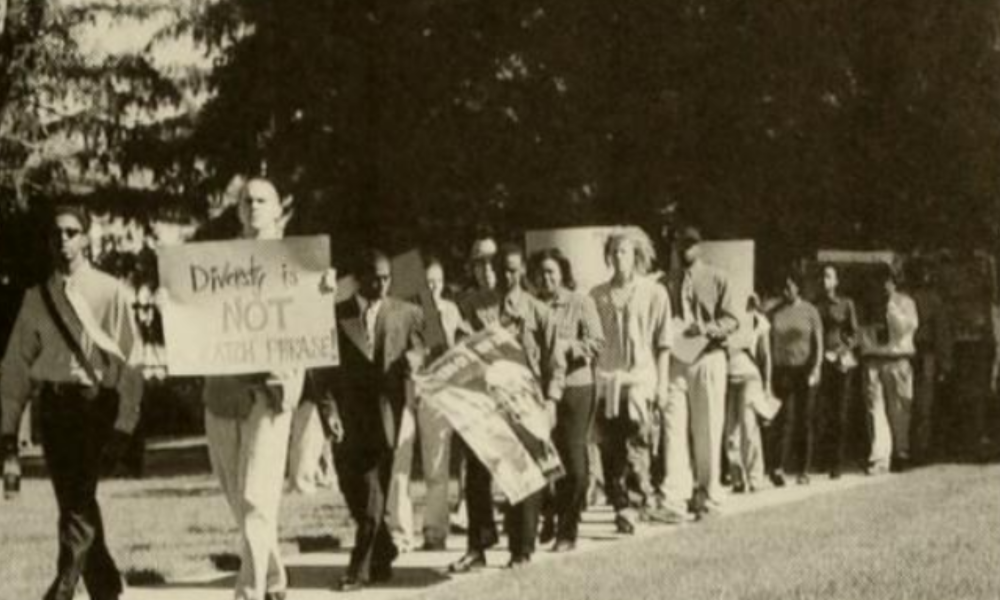
Among the reasons Emry cited that the administration gave for not honoring MLK Day was that “students would just take a long weekend[…] What are they doing [with the holiday for the inauguration]? I saw so many people rolling out of town last night” (3).
Chris Jones, who would go on to become Harrisonburg Mayor and City Councilman, told The Breeze in 1999 that students were “tired of being pacified” (9). Referencing JMU’s April decision to appoint a task force to consider the recognition of MLK Day:
"We’ve been asking and have not heard responses. Hopefully, we will have the chance to discuss [these issues] and resolve them instead of creating a task force to study it. […] [We] would like to see some administrative money and effort. If they can put this much effort into one day, hopefully, they can listen to us." -Chris Jones, The Breeze, 1999
Later in the article, he called university officials to account for their commitment to diversity: “[They] speak of diversity when it is convenient. Before we go toward national prominence, we have to shore up what we have here. And what we have is good, but we have a long way before we’ll have our ducks in a row.”
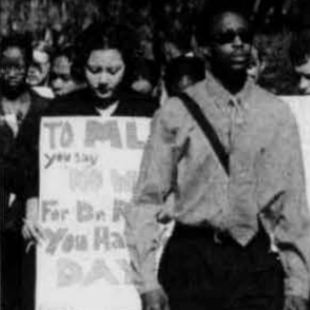
The protest received mixed reactions from attendees of the inauguration. Many were quoted in The Breeze’s coverage of the protest commending protesters for how “orderly” the demonstration was, and many students left the inauguration to join the protest. “I came out to join what they were doing because the more I saw them out here, the more I realized that I needed to be here,” Nicholas Pelzer, a then-junior at JMU, said. Referencing the “All Together One”-themed speech Rose gave at the inauguration, Pelzer added: “The things [Rose was saying] sound good when they are on paper when an orchestra is playing behind you, but we’re not getting these things done every day” (9). Pelzer wasn’t the only one to feel that way.
Senior writer Courtney Crowley wrote in her coverage of the inauguration that Rose’s goals were “both lofty and sensible” but “were far too nebulous, and therefore amount to little more than flowery rhetoric” (5). Several students, however, made their disagreement and disappointment with the protest known. One student stated that he found the protest “inappropriate,” saying that “MLK [Day] is an annual holiday, whereas this school hasn’t held a presidential inauguration in [28] years,” (9). Another editorial stated that "having an entire day off for [the inauguration] when we will get just a half-day for Martin Luther King Jr. Day after the arduous fight that transpired last year is slightly hypocritical, but this is an important and rare moment in the university's history and should not be judged on the same standard of a holiday that occurs annually" (10).
After the protest, JMU once again met over the issue and finally voted to recognize MLK Day as a university holiday starting in 2001. Since then, the university has not held classes on MLK Day in observance of the holiday and holds annual events in honor of MLK Day, all thanks to the power of student activism.
In 2022, poet Nikki Giovanni served as keynote speaker for CMSS's annual event in honor of Martin Luther King, Jr.
